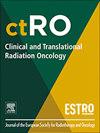Decision regret after reirradiation of the primary site in patients with prostate cancer
IF 2.7
3区 医学
Q3 ONCOLOGY
引用次数: 0
Abstract
Purpose
A subset of prostate cancer patients develops local relapse at the primary site after radiotherapy. The optimal local salvage strategy is unknown. Therefore, we aimed to explore prevalence and determinants of decision regret among patients after reirradiation of the primary site.
Materials and methods
We surveyed 31 patients in a cross-sectional bi-centre exploratory study. Reirradiation was high dose-rate brachytherapy (HDR-BT) in 21 and stereotactic body radiotherapy (SBRT) in 10 patients. Decision regret (DR) was measured using the Decision Regret Scale (DRS) (range: 0–100; higher values higher regret). Further patient-reported outcomes (PRO) included the EPIC-26, EORTC QLQ-C30, PRO-CTCAE, and PSCC questionnaires. Univariable associations of decision regret and potential determinants were assessed by one-way ANOVA or Pearson’s correlation.
Results
Median age at reirradiation was 75 years. Median time intervals from initial radiotherapy to reirradiation was 8 years and 4 years from reirradiation to survey. The mean DRS score was 10 (SD: 14). No (0 points), mild (1–25 points), or strong regret (>25 points) was reported by 45 % (14/31), 48 % (15/31), and 7 % (2/31) of the patients, respectively. DR was significantly associated with PRO of urinary symptom burden and toxicity as well as levels of shared-decision making and patient satisfaction. HDR-BT vs. SBRT, further local relapse, and progression-free survival were not associated with DR.
Conclusions
DR was mild among prostate cancer patients after reirradiation to the primary site. PRO on symptom burden and shared decision making may be associated with DR. These findings should be validated and may inform treatment decisions on local salvage therapy.
前列腺癌患者原发部位再照射后的决定后悔
目的:部分前列腺癌患者放疗后发生原发部位局部复发。最优的局部救助策略是未知的。因此,我们旨在探讨原发部位再照射后患者决策后悔的患病率和决定因素。材料和方法我们在一项横断面双中心探索性研究中调查了31例患者。21例为高剂量率近距离放疗(HDR-BT), 10例为立体定向放射治疗(SBRT)。决策后悔(DR)采用决策后悔量表(DRS)测量(范围:0-100;价值越高,后悔越深)。进一步的患者报告结果(PRO)包括EPIC-26、EORTC QLQ-C30、PRO- ctcae和PSCC问卷调查。决策后悔和潜在决定因素的单变量关联通过单因素方差分析或Pearson相关进行评估。结果再照射时的中位年龄为75岁。从首次放疗到再照射的中位时间间隔为8年,从再照射到调查的中位时间间隔为4年。DRS平均评分为10分(SD: 14)。45%(14/31)、48%(15/31)和7%(2/31)的患者报告无后悔(0分)、轻度后悔(1-25分)和强烈后悔(25分)。DR与泌尿症状负担、毒性、共同决策水平和患者满意度的PRO显著相关。HDR-BT vs. SBRT、进一步局部复发和无进展生存期与dr无关。结论前列腺癌患者原发部位再照射后dr为轻度。关于症状负担和共同决策的PRO可能与dr有关,这些发现应该得到验证,并可能为局部挽救性治疗的治疗决策提供信息。
本文章由计算机程序翻译,如有差异,请以英文原文为准。
求助全文
约1分钟内获得全文
求助全文
来源期刊

Clinical and Translational Radiation Oncology
Medicine-Radiology, Nuclear Medicine and Imaging
CiteScore
5.30
自引率
3.20%
发文量
114
审稿时长
40 days
 求助内容:
求助内容: 应助结果提醒方式:
应助结果提醒方式:


